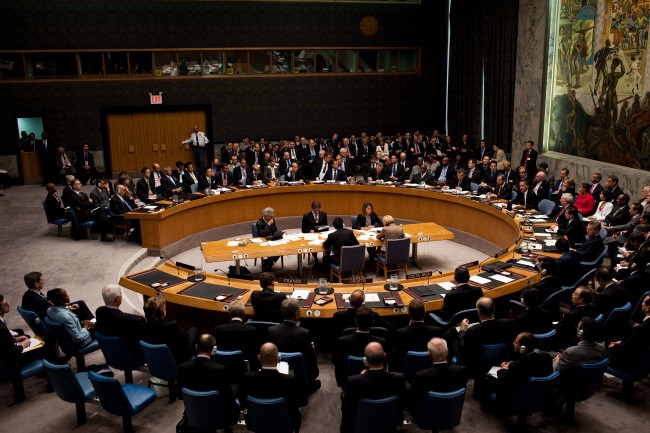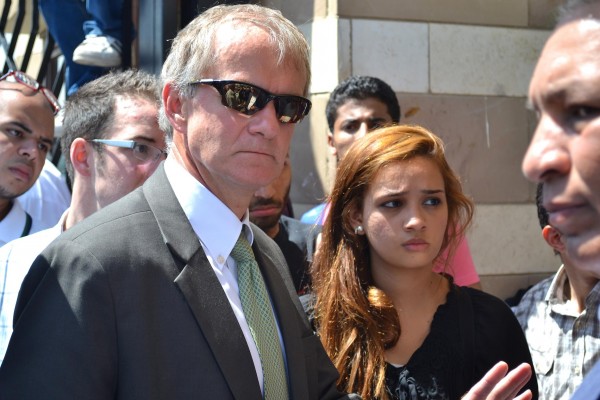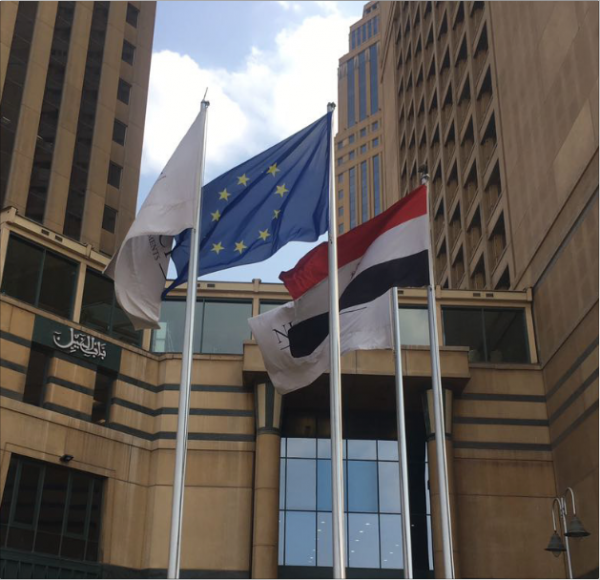Egypt Seeks a Pivotal Global Role Through Bid for Security Council Seat
BY ABDELHAMID MAHMOUD
@HAMIDMAHMOUD12
![[Photo of the Security Council in session, licensed for noncommercial reuse through Wikipedia]](http://www.auccaravan.com/wp-content/uploads/2015/10/Barack_Obama_chairs_a_United_Nations_Security_Council_meeting-e1444514939104.jpg)
The UNSC is currently comprised of five permanent member states (China, France, Russia, UK and US) with exclusive veto power, and 10 non-permanent members who rotate membership every two years.
Egypt is hoping to be elected to the two-year seat (2016-2017) of the African Group representing North Africa. Its bid has been supported by the Arab Parliament and received a boost at the African Union Summit last January.
It comes at a time of heightened instability in a number of North African and Middle Eastern countries.
Nabil Fahmy, former Minister of Foreign Affairs and Dean of the School of Gloabal Affairs and Public Policy, said that “the seat brings Egypt not only an internal resposibility, but also a regional, Arab and African responsibility”.
A seat in the UNSC means that Egypt will help shape policy within the framework of a body that protects international peace, face and resolve armed conflicts, and take serious actions against countries who don’t abide by the UN Charter.
“The chances of Egypt winning the bid is a thousand percent for two reasons,” Fahmy told The Caravan.
“The first is the inexistence of competitors to Egypt; the second is the esteemed position Egypt has in the region.”
He highlighted that Arab and African countries will be in contact with Egypt to put forward their issues. Africa is currently represented by two countries on the UNSC, whereas Arabs are currently represented by one seat: Jordan’s.
Jordan held a non-permanent member seat for the period 2014-2015. The Jordanian seat benefited Egypt, and the Arab world, according to Fahmy.
“We were in contact with the Jordanian Delegation, to raise issues concerning Egypt – the peace process in particular – also Al-Aqsa Mosque, and how to avoid terrorism conflicts,” he said.
Ambassador Rakhaa Ahmed Hassan, a member of the Egyptian Council for Foreign Affairs, also believes chances are very high thatEgypt will win the seat.
“Egypt’s seat at the Security Council is all but assured because there won’t be any objections from the permanent members,” Hassan told The Caravan.
He said that Egypt’s role in regional and global issues, as well as its active diplomacy, gives it an edge. Hassan added that a number of international groups, including the Non-Aligned Movement, the African Union, the Organization of Islamic Cooperation, and the Arab League support Egypt’s bid. Egypt is also a participant in UN global peacekeeping operations.
“Egypt is one of the largest countries that is participating in the United Nations peacekeeping troops, as it currently contributes with about 2547 members of army, police, and civilian elements in nine peacekeeping missions,” said Abou Bakr Hefni, Egyptian Ambassador to Ethiopia and the permanent representative of Egypt to the African Union and the United Nations Economic Commission in Africa.
Regional crises
The Middle East and North Africa region has much changed since Egypt last held a non-permanent member seat at the UNSC in 1997.
The 2003 invasion and occupation of Iraq and the subsequentregionalconflicts, particularly the rise of Al- Qaeda and its offshoots, have made the region very volatile.
Hassan particularly focused on the Syrian crisis, which he described as ‘sensitive’, exacerbated by Russia’s decision to strike Islamist extremist forces, including the Islamic State of Iraq and the Levant (ISIL, or ISIS).
The ongoing conflict between the Saudi Arabian- backed Yemeni government and Iran-backed Houthi rebels is also critical. Meanwhile, the civil war continues in newly independent South Sudan despite the presence of international forces in the country.
And in the West, the situation in Libya is unstable, with rival forces battling for control of the country.
Efforts are underway to form a unity government, but the danger lies in that ISIL has taken advantage of the lawlessness there and created a base of operations in Libya.
Fahmy said that Egypt would use its seat to highlight regional and Middle Eastern crises, including reiterating its “initiative to establish a nuclear-freezone in the Middle East.”
Egypt will also focus on the Israeli-Palestinian peace process, Palestinian statehood and protecting the Al Aqsa Mosque.
Last week, the foreign ministry warned of Israeli escalation and aggression against Palestinian protesters in Jerusalem and the dangers to the Mosque. But the UNSC is not without its faults.
Arab countries have long accused it of double standards. Fahmy told The Caravan that in 2014, Saudi Arabia waived its seat membership to Jordan because it was unhappy with the way the UNSC dealt with a number of different issues.
“[Saudi Arabia] was displeased with the double standards in the Security Council, from not enforcing the resolutions issued from the Council, as well as not implementing the UN resolutions.”
The Chair of Egyptian Women in Foreign Policy group and Former Minister of Family and Population Moushira Khattab sees the same discrepancies in applying UNSC resolutions when it comes to dealing with ISIL.
“There are double standards in the UN from some of the superpowers, as there was a global alliance against ISIL and when you take a look into [the details], you will find lack of consistency and politicization in the actions taken.”
Diplomatic track
Meanwhile, Egypt is pushing ahead with its diplomatic initiatives to secure the non- permanent member seat, a culmination of efforts which began last year.
In 2014, Egyptian Foreign Minister Sameh Shoukry distributed to the UNSC permanent members a booklet which highlights Egypt’s contributions in the war on terror, as well as the country’s efforts in peacekeeping operations in an area of the world that is plagued by war and armed conflicts.
Khattab says that one of these initiatives also involved inviting the UNSC permanent members to tour Egypt and attending a retreat in the World War II- famous town of El Alamein.
“There was a roundtable discussion, and I was one of the speakers, and pointed the role of the Security Council,” Khattab said.
She says that the UNSC permanent members found the visit fruitful; Khattab believes the initiative significantly improved Egypt’s bid.




